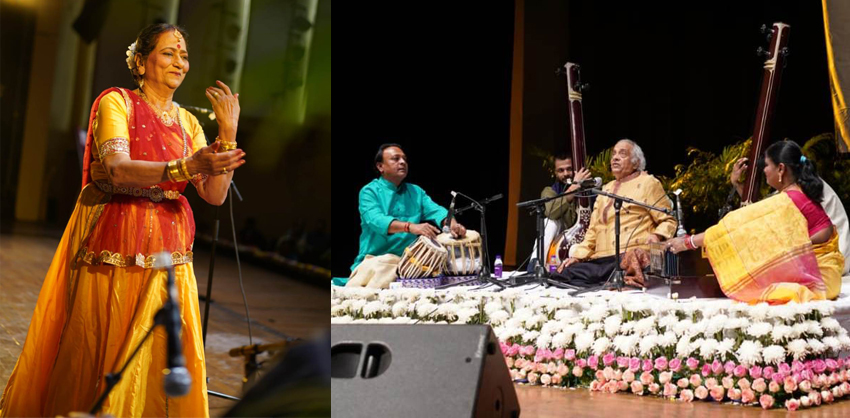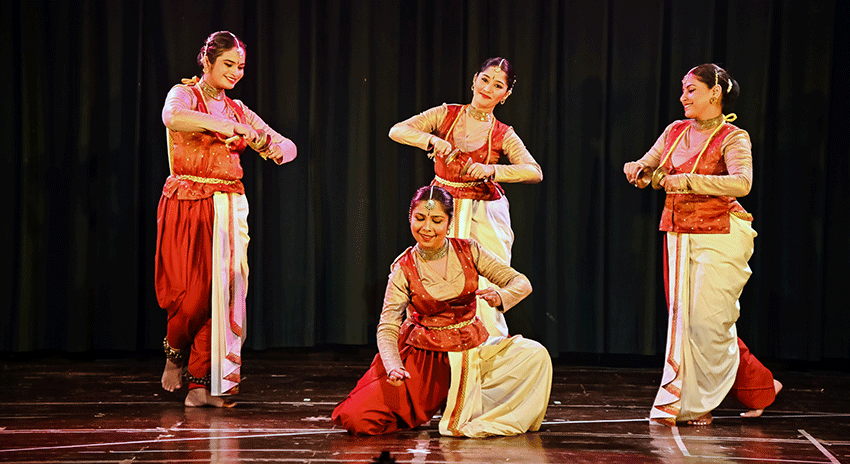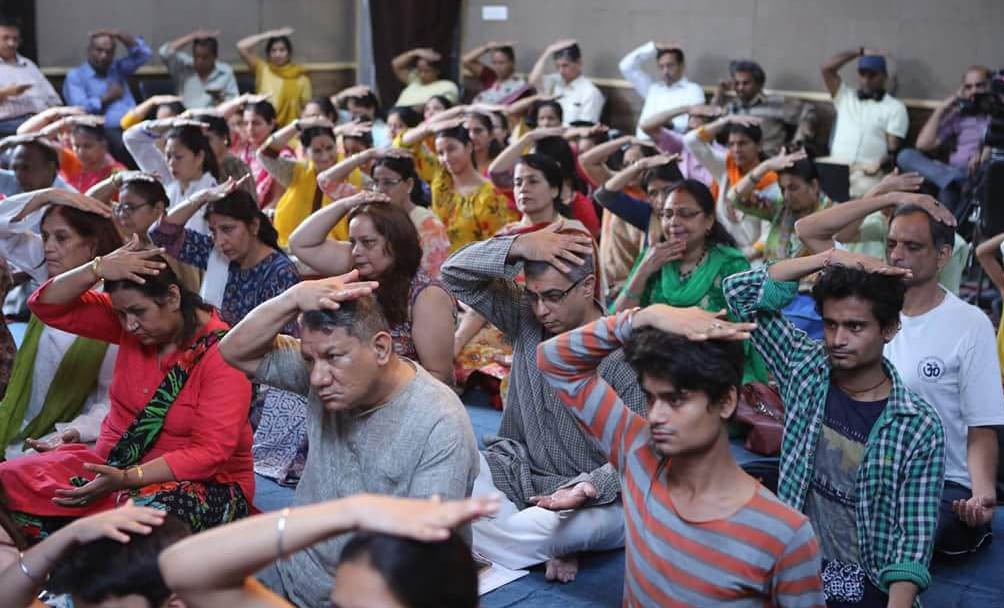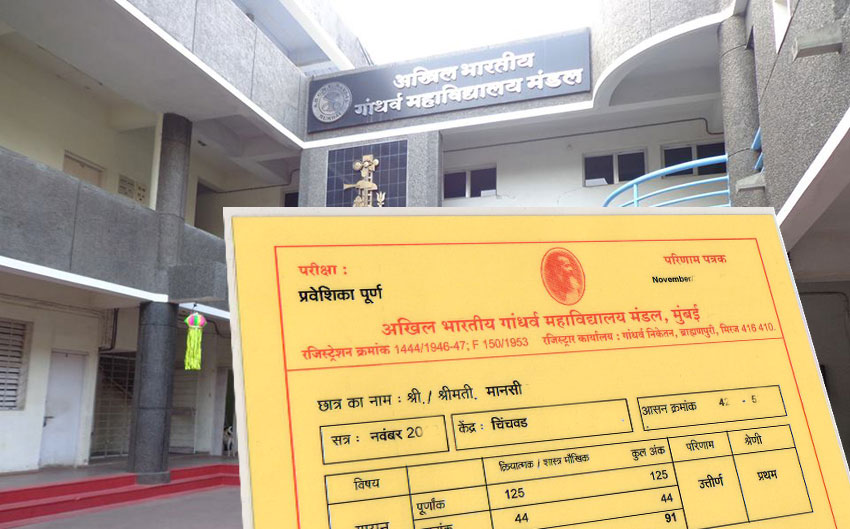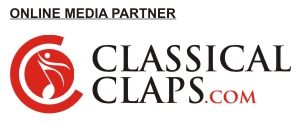Late Guru M. L. Kosar founded Pracheen Kala Kendra (PKK), Chandigarh, in the year 1956. The reputed institution dedicated to Art & Culture, conducting regular classes and exams with degree courses has its regional offices in Delhi, Kolkata, Bhuvaneshwar, Patna and Jorhat – Assam. It also organizes festivals, workshops and seminars on a regular basis. The annual Guru M. L. Kosar Music & Dance Festival is celebrated in memory of its Late Founder, who dedicated his life to perpetuating and propagating Music & Dance, Art & Culture.
The 10th Guru M. L. Kosar Festival of Music and Dance was presented by PKK at the Kamani auditorium, Delhi. The two-day festival opened with an ingenious Kathak performance by Dr Shobha Kosar accompanied by Shri Fateh Singh Gangani on Tabla Madho Prasad – Vocal, Vinay Prasanna – Flute, Mehmood Khan-Tabla & Padhant and Salim Kumar on Sitar.
The veteran representative of Jaipur Gharana of Kathak, Guru Shobha Kosar, looked vibrant and energetic as usual, defying her age. She heartily greeted her audiences and the accompanying artists before opening with Bhavani Ashtakam. Each and every Sanskrit Sloka ended with ‘Tvameka. Tvameka Tvameka Bhavani’, invoking various aspects of Devi, the Supreme energy. Shobha also remembered her Late husband Shri M. L. Koser who always encouraged her to do something new and presented Thaat, Chaala, a few Parans and Tode with Chakkardaar and a swing-like Tihai. The graceful Thaat had striking ‘Nazar Ka Kaam’ and the ‘Chaala’ getting obsolete these days, incorporating varied rhythmic patterns in Tisra, Khand, Chatusra, Misra and Sankirna Jatis.
Before proceeding to the Abhinaya segment, she also presented a couple of Todas. The one with Radha-Krishna ‘Chhed-Chhad’ and another with the colourful imagery of Holi, the festival of colours. These along with the ‘Gat-Nikas’ with Ghoonghat ki Gat, created the perfect preface for the romantic Thumri “Dekho dekho Shyam karat barajori”, her own composition. Shobha regaled the audience by singing the Thumri herself while emoting before Madho Prasad carried forward the singing for her subtle Abhinaya. The concluding Laggi on Fateh Singh Gangani’s Tabla was matched by her crisp foot work.
There was a separate item on Nayika Bhed “Hoon to baar baar tori yaad karat…”, where Shobha’s lucid depiction of Vipralabdha, Abhisarika, Virahotkanthita and Khandita Nayikas bore the stamp of her creativity in the nuanced imagery of their myriad Manobhavas. She concluded with the Bhajan “Hey Govinda Hey Gopal…” where each stanza was followed by the Sanchari of its mythological content like the Gajendra-Moksha and the Draupadi Cheer-Haran episodes. Her moving Abhinaya was underscored with her personal prayer when she concluded by saying “I earnestly pray my Govinda to grant me the boon of dancing till my last breath!”
The second half of the inaugural evening had an electrifying Tabla Jigalbandi (Duet) by Pt. Yogesh Shamsi of Punjab Gharana and Ud. Akram Khan of Ajarada Gharana, accompanied on Harmonium by Milind Kulkarni and Ehsan Ali on Sarangi. A distinguished disciple of Ustad Allah Rakha Khan, the doyen of Punjab Baaj (style) of Tabla; Pt. Yogesh Shamsi is the son of Pt. Dinkar Kaikini the renowned vocalist of Agra Gharana, hence the musicality of his Tabla and his insistence on perfect tunefulness was an added attraction. Ustad Akram Khan, a senior representative of Ajrada Baaj of Tabla is the son and disciple of Ud. Hashmat Khan and the most sought-after Tabla player of Delhi.
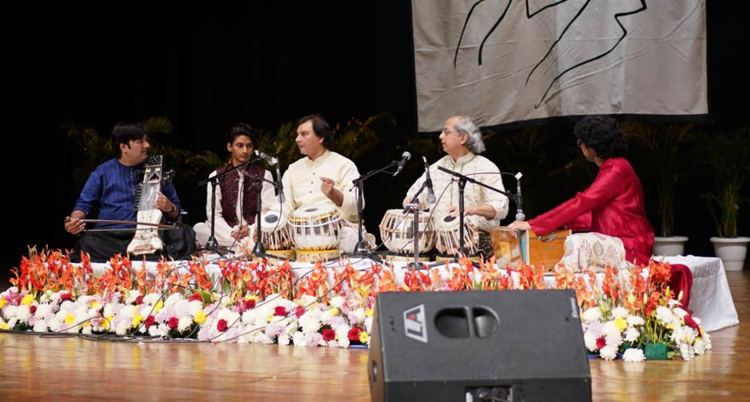 Normally Solo or Duet Tabla recitals open with the accompanying artist on Harmonium or Sarangi, creating a musical ambiance for the Lehera that works as the base with a repetitive refrain in a chosen raga. The Sarangi this evening took the lead where the raga felt like Shyam-Kalyan; followed by the Harmonium that sounded like raga Saraswati, to begin with, and came to terms with the Sarangi only after he touched the Gandhar. And this confusion continued throughout the Lehera, which was quite distracting for the discerning audiences.
Normally Solo or Duet Tabla recitals open with the accompanying artist on Harmonium or Sarangi, creating a musical ambiance for the Lehera that works as the base with a repetitive refrain in a chosen raga. The Sarangi this evening took the lead where the raga felt like Shyam-Kalyan; followed by the Harmonium that sounded like raga Saraswati, to begin with, and came to terms with the Sarangi only after he touched the Gandhar. And this confusion continued throughout the Lehera, which was quite distracting for the discerning audiences.
The Tabla Jugalbandi in Teentala took a melodious start with Yogesh playing an Alaap like Peshakara in the slow-pace of Teentala; joined by Akram replying with the distinct flavour of his own Tabla Baaj to the same Peshkara theme. Both kept taking turns till a long-winding Tihai that reduced from long to short Aavartanas, finally coming together on the long-awaited ‘Sam’ heralding thunderous applause. The front row of Kamani was star-studded with musicians, especially with the Tabla players of various Gharanas Both the Tabla players were seasoned artists and they offered the choicest gems from the treasure trove of their specific Gharana repertoires. No wonder this was a memorable feast.
The second evening opened with the vocal recital by Pt. Ajay Pohankar, who chose Bageshri, the late evening raga for his main presentation with a Bada Khayal set to Vilambit Ektaal followed by a Chhota Khayal in Teentaal. The progressive development of the raga was pleasing, not just grammatically correct. He then presented a Thumri in raga Pahadi concluding with Bhairavi, but on public demand, he had to sing a Kajri also. Paromita Mukherjee’s sensitive support on Harmonium inspired the vocalist. Debashish Adhikari provided him with the Tabla support.
The two-day festival concluded with the mesmerising Sitar recital by Purbayan Chatterjee, one of the star artists of Maihar Gharana’s present generation Sitarists. Purbayan was ably accompanied on Tabla by Pt. Tanmoy Bose who was wrongly announced as Tammay Boss. With tongue in cheek Purbayam commented “as you have just heard Tanmoy Da on Tabla is the Boss, I will just play with him”, and continued “There is another correction for the able announcer who changed the name of our highly respected Sitar maestro Pt. Nikhil Bannerjee to Nikhil Chatterjee.” One wished that instead of the flowery language and the Urdu couplets the anchor should have focused on her homework.
Like a seasoned artiste, Purbayan played a detailed Aalap-Jod and traditional Gat compositions in raga Gaoti, set to Vilambit (slow) and a Madhya Laya (medium tempo) Teentala respectively. He delineated the melodious raga most sensitively with feeling and beauty. Both Purbayan and Tanmoy Bose felt like sharing the same wavelength and enjoying each other’s music. Gaoti was followed by a Madhya Laya Gat composition in raga Jog. Purbayan concluded his melodious Sitar recital with the nostalgic Bhairavi Dadra of Begum Akhtar “Hamari ataria pe aa ja re Sanvaria, dekha-dekhi Balam hoi jaye re…” where Tanmoy played a brilliant Laggi reaching the performance to its climax.



